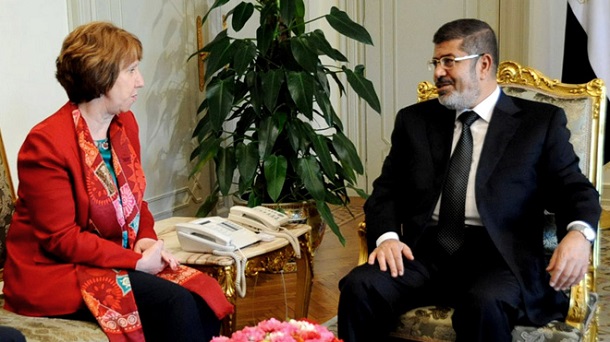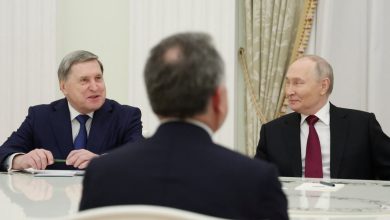Egypt’s ousted president Mohamed Morsi is doing “well” and has access to information, the EU foreign policy chief Catherine Ashton has said.
European Union Foreign Policy chief Catherine Ashton said she had “friendly, open and very frank” talks with Mr Morsi, who has not been seen in public since the army coup which removed him from power on July 3.
Speaking hours after their meeting, she said she could not reveal precise details of their two-hour discussion.
“He has access to information in terms of TV and newspapers so we were able to talk about the situation and the need to move forward,” said Baroness Ashton.
The EU’s High Representative for Foreign Affairs and Security Policy said she saw the facilities Mr Morsi has access to, but did not know the location.
Calling for Egypt to build a “deep democracy”, she added: “All the people that I have been talking with are absolutely aware that this great country has to move forward and has to do so in an inclusive way.
“I’ve urged everyone to think very carefully about how you include everybody in the process.”
It has not been revealed where the meeting with Mr Morsi took place but it is understood that Baroness Ashton headed there by military helicopter early on Tuesday.
The deposed president is being kept at an undisclosed location by the new regime.
The meeting comes during a visit where she has also met General Abdel Fattah al Sisi, the head of the army and the man behind Mr Morsi’s overthrow.
The visit follows a weekend of violence that saw 82 people killed during a pro-Morsi rally in Egypt Capital Cairo.
Government officials have rejected witness accounts that police fired on crowds and an investigation is under way.
Baroness Ashton said she had urged all sides to “find a calm resolution to the situation on the ground”.
“We’ve made it clear that there is no place for violence in this and that peaceful demonstration is important.
“The authorities have a huge responsibility to make sure that happens,” she added.
The EU foreign affairs chief arrived in Cairo on Sunday and has also had meetings with interim vice-president Mohamed ElBaradei, interim president Adly Mansour and representatives of the Muslim Brotherhood’s political wing.
The European Union is keen to mediate in what has become an increasingly violent situation.
Before arriving in Egypt, Catherine Ashton said she would press for a “fully inclusive transition process, taking in all political groups, including the Muslim Brotherhood”.
During her last visit, on July 17, she unsuccessfully asked to meet Mr Morsi and urged for him to be released.
The democratically-elected former leader is being held on suspicion of crimes relating to his escape from prison during the 2011 uprising that overthrew ex-president Hosni Mubarak.
He was removed from power on the back of huge popular protests against his rule.
Mr Morsi, his Muslim Brotherhood group and its Islamist allies have rejected the military-appointed leaders who have replaced him.
The interim government is pushing ahead with a fast-track plan to return to a new democratically-elected government by early next year.
Protesters from the Anti-Coup Alliance of Islamist groups, which organised the weekend protests, has called for a “million-person march” on Tuesday.
They called on Egyptians “to go out into the streets and squares, to regain their freedom and dignity”.
France’s foreign minister Laurent Fabius also came out on Tuesday and called for Mr Morsi’s release.
Error, group does not exist! Check your syntax! (ID: 14)

